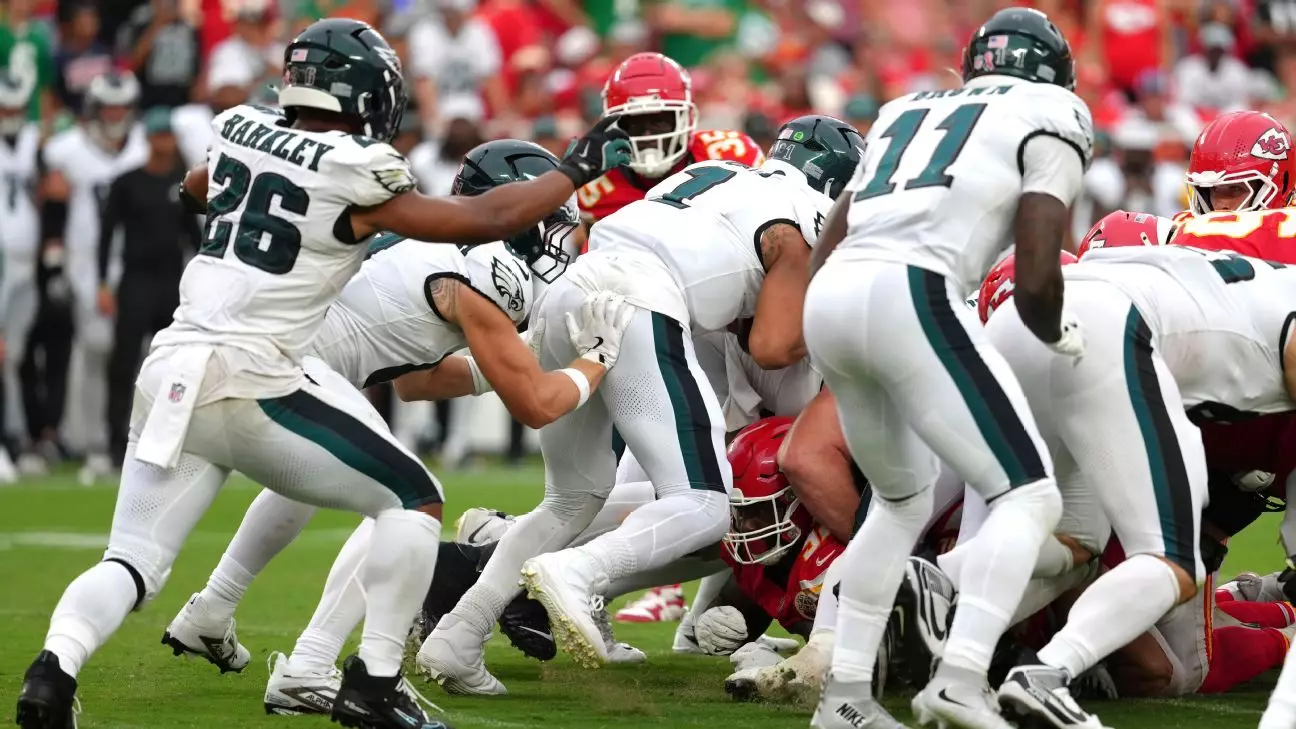In recent days, the NFL’s attempt to clamp down on the controversial “tush push” play has surfaced as a stark example of the league’s conflicting priorities. On one hand, the league claims a desire for fairness and consistency; on the other, its selective enforcement reveals a hierarchy of favoritism that undermines these very principles. The NFL’s decision to instruct officials to call the play “tight” reflects a troubling inconsistency that exposes how superficial notions of fairness often serve as mere rhetoric rather than genuine policy.
For years, the tush push has been one of the most successful short-yardage plays in the league, with teams like the Eagles executing it at an astonishing rate. This success highlights not just a clever tactic but a systemic advantage that arguably skews the playing field. Yet, instead of addressing the underlying issue of whether this play constitutes an unfair advantage, the NFL appears more inclined to Polaroid-style reactionism—reacting to recent scrutiny rather than proactively ensuring genuine fairness. This selective tightening seems less about maintaining integrity and more about placating critics who threaten the league’s image.
Moreover, the league’s messaging reveals a troubling tendency to target specific teams rather than establish clear, equitable standards applicable across the board. By instructing officials to call the play “tight,” the NFL implicitly signals that certain teams—most notably the Eagles—are being singled out for what has long been viewed as a strategic but controversial play. This favoritism not only undermines the credibility of officiating but also fosters an environment where talented teams feel subjected to unjust scrutiny, which can influence game outcomes and playoff positioning.
The Impact of Bias and the Erosion of Credibility
The league’s approach fuels systemic bias that threatens the very legitimacy of competitive football. When officiating is guided by fluctuating standards—sometimes lenient, sometimes strict—the game devolves from a contest of skill into a rigged spectacle. The Eagles’ practice of running the tush push has, by many accounts, become a symbol of tactical ingenuity, yet now it is being weaponized as a problem to be eradicated, despite its high success rate (an astounding 96.6% since 2022). Such measures suggest an overreach that presumptively penalizes innovation over fairness.
Furthermore, the vocal criticism from figures like Chiefs coach Andy Reid and retired stars like Tom Brady reveals a disturbing bias bleeding through the official narratives. The accusations of pre-snap movement or offside, based solely on visual judgments, cast doubt on the impartiality of referees who are seemingly pressured to enforce the play in a way that disadvantages certain teams. When the league seems to selectively target teams based on their playing style or recent controversies, the integrity of the sport diminishes in the eyes of the fans.
The mismanagement of this controversy also exposes a fundamental weakness in league governance—an inability or unwillingness to adapt rules proactively and transparently. Instead, they choose a reactive stance, embroiled in knee-jerk reactions rather than constructing long-term policies rooted in fairness and innovation. This approach fosters distrust among fans and players alike, who become increasingly disillusioned with a league more concerned with optics than equity.
The Future of Innovation and Fair Play in the NFL
The failed attempt to ban the tush push this offseason signals a broader conflict within the NFL—balancing tradition, innovation, and fairness. The fact that the proposal fell just short, with 22 votes against and 10 in favor, underscores a league divided on whether to embrace or suppress strategic evolution. Philadelphia’s mastery of the play exemplifies how teams adapt to the rules, pushing boundaries to maximize success within the constraints of the game. Banning it outright would not resolve the underlying issue but would instead diminish the sport’s tactical richness.
If the NFL genuinely aspires to a fair and exciting game, it must recognize that attempting to suppress innovation—particularly when it has demonstrated high success—is both shortsighted and detrimental. Instead, the league should focus on establishing clear, consistent standards that allow teams to compete fairly without fear of capricious officiating. This might involve rigorous, transparent enforcement of existing rules or revisiting regulations that implicitly endorse certain plays, thereby fostering a more equitable competitive environment.
In the final analysis, the NFL’s recent actions reveal a sport grappling with its identity amidst mounting scrutiny. It must decide whether to uphold the integrity of competition by embracing transparency and fairness or continue down a path where selective enforcement and favoritism threaten to erode the core values that drew fans to the game in the first place. Fair play is about more than rules; it’s about trust, consistency, and respect—values that the league must prioritize if it hopes to sustain the sport’s legitimacy and appeal in the long run.


Leave a Reply